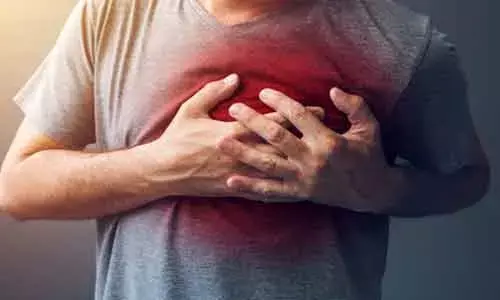- Home
- Medical news & Guidelines
- Anesthesiology
- Cardiology and CTVS
- Critical Care
- Dentistry
- Dermatology
- Diabetes and Endocrinology
- ENT
- Gastroenterology
- Medicine
- Nephrology
- Neurology
- Obstretics-Gynaecology
- Oncology
- Ophthalmology
- Orthopaedics
- Pediatrics-Neonatology
- Psychiatry
- Pulmonology
- Radiology
- Surgery
- Urology
- Laboratory Medicine
- Diet
- Nursing
- Paramedical
- Physiotherapy
- Health news
- Fact Check
- Bone Health Fact Check
- Brain Health Fact Check
- Cancer Related Fact Check
- Child Care Fact Check
- Dental and oral health fact check
- Diabetes and metabolic health fact check
- Diet and Nutrition Fact Check
- Eye and ENT Care Fact Check
- Fitness fact check
- Gut health fact check
- Heart health fact check
- Kidney health fact check
- Medical education fact check
- Men's health fact check
- Respiratory fact check
- Skin and hair care fact check
- Vaccine and Immunization fact check
- Women's health fact check
- AYUSH
- State News
- Andaman and Nicobar Islands
- Andhra Pradesh
- Arunachal Pradesh
- Assam
- Bihar
- Chandigarh
- Chattisgarh
- Dadra and Nagar Haveli
- Daman and Diu
- Delhi
- Goa
- Gujarat
- Haryana
- Himachal Pradesh
- Jammu & Kashmir
- Jharkhand
- Karnataka
- Kerala
- Ladakh
- Lakshadweep
- Madhya Pradesh
- Maharashtra
- Manipur
- Meghalaya
- Mizoram
- Nagaland
- Odisha
- Puducherry
- Punjab
- Rajasthan
- Sikkim
- Tamil Nadu
- Telangana
- Tripura
- Uttar Pradesh
- Uttrakhand
- West Bengal
- Medical Education
- Industry
Iron treatments may reduce heart attacks in patients on dialysis

A new paper in Cardiovascular Research, published by Oxford University Press, indicates that iron treatments may reduce heart attacks in patients experiencing kidney failure undergoing dialysis.
Coronary artery disease is prevalent in patients with chronic kidney disease but how often heart attacks occur in patients on maintenance hemodialysis and the appropriate treatments to try to prevent heart attacks in such cases is a matter of debate. Observational studies in humans and animal studies lead some researchers to express concern that intravenous iron could increase the prevalence or severity of heart attacks. Others argue that, because iron is likely to result in more oxygen delivery, intravenous iron may reduce coronary events. But there was limited research to support this.
This paper is an analysis of 2141 patients enrolled in the Proactive IV Iron Therapy in Haemodialysis Patients (PIVOTAL) trial, a large-scale controlled experiment at 50 sites in the United Kingdom. The researchers here investigated the effects of high-dose versus low-dose intravenous iron in patients on hemodialysis. They report the rates of heart attacks, types of heart attacks, the prognostic importance of these heart attacks, as well as the effect of high versus low dose iron.
The researchers measured the impact of iron interventions on type 1 heart attacks (the most common type of heart attacks, which results from a blood clot or some other blockage in blood flow) and type 2 heart attacks (which occur without a blockage, in situations where the heart needs more oxygen than it's getting). The researchers found that 8.4% of patients on dialysis had heart attacks over two years. Rates of type 1 heart attacks were 2.5 times higher than type 2 heart attacks.
High dose intravenous iron reduced heart attacks compared to low dose intravenous iron. Heart attacks occurred in 76 of 1093 patients (7%) in the high dose group and 100 of 1048 patients (9.5%) in the low dose group. Type 1 heart attacks occurred in 5.5% of patients in the high dose group and 7.3% in the low dose group. Investigators found no reduction in type 2 heart attacks from intravenous iron intervention.
"Very few therapies investigated in people on dialysis have been shown to improve outcomes," said the paper's lead author, Mark Petrie. "We are delighted that high dose iron given into people veins reduces heart attacks. Our hope that this treatment is used around the world in people with kidney failure on dialysis."
https://academic.oup.com/cardiovascres/advance-article/doi/10.1093/cvr/cvab317/6454738
Hina Zahid Joined Medical Dialogue in 2017 with a passion to work as a Reporter. She coordinates with various national and international journals and association and covers all the stories related to Medical guidelines, Medical Journals, rare medical surgeries as well as all the updates in the medical field. Email: editorial@medicaldialogues.in. Contact no. 011-43720751
Dr Kamal Kant Kohli-MBBS, DTCD- a chest specialist with more than 30 years of practice and a flair for writing clinical articles, Dr Kamal Kant Kohli joined Medical Dialogues as a Chief Editor of Medical News. Besides writing articles, as an editor, he proofreads and verifies all the medical content published on Medical Dialogues including those coming from journals, studies,medical conferences,guidelines etc. Email: drkohli@medicaldialogues.in. Contact no. 011-43720751


